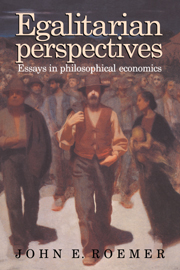Book contents
- Frontmatter
- Contents
- Acknowledgments
- List of sources
- Introduction
- Part I Exploitation
- Part II Equality of resources
- Part III Bargaining theory and justice
- Part IV Public ownership and socialism
- Introduction to Part IV
- 13 On public ownership
- 14 The morality and efficiency of market socialism
- 15 A future for socialism
- References
- Index
14 - The morality and efficiency of market socialism
Published online by Cambridge University Press: 23 December 2009
- Frontmatter
- Contents
- Acknowledgments
- List of sources
- Introduction
- Part I Exploitation
- Part II Equality of resources
- Part III Bargaining theory and justice
- Part IV Public ownership and socialism
- Introduction to Part IV
- 13 On public ownership
- 14 The morality and efficiency of market socialism
- 15 A future for socialism
- References
- Index
Summary
Moral issues
One can defend the moral legitimacy of the institution of public property in two ways: on grounds of rights and on egalitarian grounds. An argument against public ownership on grounds of rights is presented by Robert Nozick (1974), and rebutted by G. A. Cohen (1985). Nozick's argument is well known and hardly need be rehearsed here. A person has a right to appropriate part of the natural world as his private property, as long as the consequences of the appropriation are such that no one is worse off than he would have been had the property remained in its natural state. In this way, one can conceive of a scenario in which eventually no part of the natural world remains unowned and all objects that are made from it and labor belong to individuals. Cohen responds that Nozick has an implicit assumption that the natural world is, morally speaking, originally unowned and, hence, up for grabs. But why not postulate that, morally speaking, the natural world is originally publicly owned? What would this mean? That no one would have a right to appropriate part of it as his own unless the public so agreed (by whatever decision-making procedure it has). But would not the public approve appropriations if Nozick's condition held, that is, if an appropriation would leave no one worse off – or, to sweeten the pot, let's say if it would leave everyone better off – than before the appropriation? No.
- Type
- Chapter
- Information
- Egalitarian PerspectivesEssays in Philosophical Economics, pp. 287 - 302Publisher: Cambridge University PressPrint publication year: 1994



